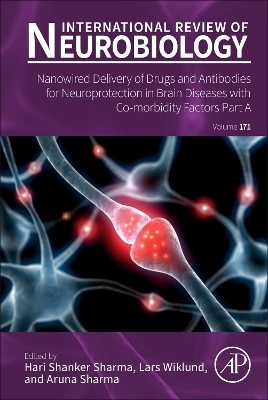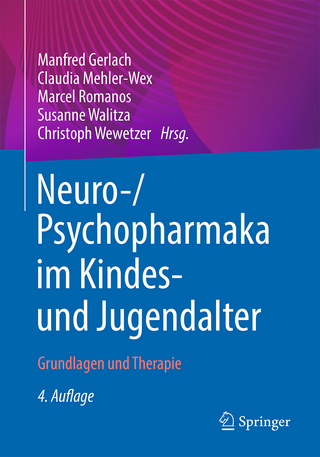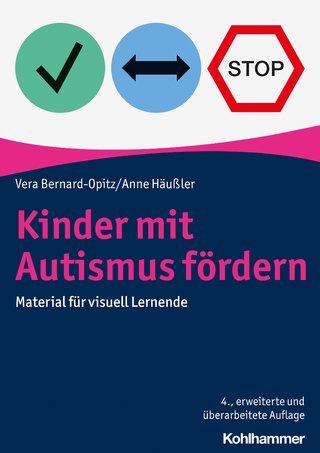
Nanowired Delivery of Drugs and Antibodies for Neuroprotection in Brain Diseases with Co-morbidity Factors Part A
Academic Press Inc (Verlag)
978-0-323-99777-5 (ISBN)
Other sections cover Sleep deprivation induced exacerbation of Parkinson's disease pathophysiology is attenuated by co-administration of nanowired cerebrolysin and serotonin-3 receptor antagonist ondansetron, Co-administration of DL-3-n-butylphthalide and neprilysin is neuroprotective in Alzheimer disease associated with brain injury, Stress and brain diseases, Pathophysiology of sleep deprivation enhances amyloid beta peptide and p-tau in the CSF and brain, Neuroprotective effects of nanowired delivery of multimodal drug cerebrolysin and monoclonal 5-HT antibodies, Prior heat exposure exacerbates brain blast injury, Neuroprotection by nanodelivery of cerebrolysin with serotonin 6 receptor antagonist SB-399885, the Effects of curcumin nanodelivery on several brain pathologies, and more.
Dr. Hari Shanker Sharma, Professor of Neurobiology (MRC), Docent in Neuroanatomy (UU) is currently working in Uppsala University Hospital, Department of Surgical Sciences, Division of Anesthesiology & Intensive Care Medicine, Uppsala University, Sweden. Dr Sharma obtained his Masters Degree from Bihar University with special expertise in Cell Biology in 1976 and was awarded the Gold Medal of Bihar University for securing 1st position in the 1st Class. Dr Sharma joined the group of Professor Prasanta Kumar Dey, a neurophysiologist, by training in the Department of Physiology, Institute of Medical; Sciences, Banaras Hindu University, Varanasi in 1977 to obtain his Doctor of Philosophy Degree (D.Phil.) in Neurosciences and was awarded his Ph.D. in 1982 on “Blood-Brain Barrier in Stress. After carrying out a series of Government of India funded Research Projects on the BBB and brain dysfunction (1982–1987), Dr Sharma joined the lab of Neuropathology at Uppsala University with Professor Yngve Olsson in 1988 to investigate passage of tracer transport across the BBB caused by stress or traumatic insults to the Brain and Spinal cord at light and electron microscopy. Dr Sharma was awarded the prestigious Alexander von Humboldt Foundation Fellowship of German Government (1989–1991) to work on hyperthermia induced BBB dysfunction at the ultrastructural level in the laboratory of Professor Jorge Cervós-Navarro (a living “Legend in Neuropathology in Europe). Dr Sharma again joined Uppsala University and established a network of collaboration on “Experimental CNS Injury Research Group as a lead investigator with eminent collaborators in various parts of Europe, USA, and Australia (1991–). On his work on hyperthermia Dr Sharma received the prestigious Neuroanatomy award “Rönnows Research prize of Uppsala University for “best neuroanatomical research of the year 1996 followed by the Award of the Degree of Doctor of Medical Sciences of Uppsala University in Neuroanatomy in 1999 and selected for the Best Thesis Award of the Medical faculty, “The Hwassers Prize of 1999. On his meticulous works on the Blood Brain barrier and Brain edema (2000–2003) Dr. Sharma earned the prestigious title of “Docent in Neuroanatomy of Medical Faculty, Uppsala University in April 2004. Currently his main research interest is Neuroprotection and Neuroregeneration, in relation to the Blood-brain barrier in stress, trauma, and drugs of abuse in health and disease. Dr. Sharma on his research on brain pathology and neuroprotection in different models received the prestigious award from The Laerdal Foundation of Acute Medicine, Stavanger, Norway, in 2005 followed by Distinguished International Scientists Collaboration Award by National Institute on Drug Abuse (NIDA), Baltimore, MD (2006–2008). His recent work on 5-HT3 receptor mediated neuroprotection in morphine withdrawal induced neurotoxicity won the coveted prize of Best Investigator Award 2008 and Best Scientific Presentation by European Federation of the International Association for Study of Pain (ISAP), and Awarded during their VI Annual Meeting in Lisbon, September 9–12, 2008. His recent research is aimed to find out the role of nanoparticles in Neurodegeneration and Neuroprotection using various treatment strategies that is supported by European Aerospace Research and Development (EOARD), London, UK and US Air Force Research Laboratory, Wright Patterson Air Force Base, Dayton, Oh, USA. On his works on Blood–brain barrier in hypertension and diabetes together with Romanian colleagues, University of Medicine and Pharmacy “Iuliu Hatieganu, Cluj-Napoca, Romania awarded Dr. Sharma with Honorary Doctorate of Medical Sciences in 2009. Dr Sharma’s work over 30 years on the blood-brain barrier and brain edema won him the US Neurosurgeon Dr Anthony Marmarou Award (2011) by the International Brain Edema Society at their 15th Congress in Tokyo, Japan, November 2011. His works on Nanoneuroscience and development of nanomedicine to treat the CNS injuries has won accolades at various Government and International Scotties or Organization across the World. Accordingly Dr Sharma was decorated with the most prestigious Hind Rattan Award 2012 on the eve of Republic Day of India in January 2012 and Mahatma Gandhi Pravasi Gold Medal in October 2012 in House of Lords, London, UK. Dr Sharma was also invited to organize and chair Nanosymposium in Society for Neuroscience meetings in Chicago (2009), San Diego (2010), Washington DC (2011) and New Orleans (2012). Dr Sharma has published over 380 research papers, 75 reviews, 12 monographs, and 70 international book chapters and edited 15 book volumes. Professor Emeritus Lars Wiklund works in the Department of Surgical Sciences, Anaesthesiology and Intensive Care in Uppsala University, Uppsala, Sweden. Aruna Sharma, MD is currently Secretary of Research at Uppsala University Hospital, Uppsala University, Sweden. She obtained her Bachelor of Science in 1971 and trained in Indian Medicine up to 1977 and engaged in medical research from 1978 to 1986 in India on hyperthermia induced brain dysfunction in the lab of Hari Sharma and Prasanta Kumar Dey under University Grants Commission and Indian Council of Medical Research Her main interest is now focused on Indian Medicinal drugs and their effects on the Central Nervous System Function, toxicology, neurorepair and neuroprotection. She is also investigating neurotoxicological profiles of many Ayurvedic traditional drugs with special reference to those containing metal oxide or metal ashes.
Section I: Neurodegenerative diseases Stress induced exacerbation of Alzheimer's disease brain pathology is thwarted by co-administration of nanowired cerebrolysin and amyloid beta peptide antibodies with serotonin 5-HT6 receptor antagonist SB-399885 Nanowired delivery of dl-3-n-butylphthalide with antibodies to alpha synuclein potentiated neuroprotection in Parkinson's disease with emotional stress Nanowired delivery of antibodies to tau and neuronal nitric oxide synthase together with cerebrolysin attenuates following traumatic brain injury induced exacerbation of brain pathology in Parkinson's disease Section II: Stress and brain pathology Pathophysiology of sleep deprivation enhances amyloid beta peptide and p-tau in the CSF and brain. Neuroprotective effects of nanowired delivery of multimodal drug cerebrolysin and monoclonal 5-HT antibodies Effects of curcumin nanodelivery on several brain pathologies Section III: Neurorepair and Neurorestoration Advances in Neurorestoratology: Current status and further developments Positive and negative cell therapy in randomized control trials for central nervous system diseases Nose-to-brain delivery : new developments and strategies Section V: Clinical Neurology Innovative emergency strategies for patients with severe traumatic brain injury: an IoT-based resource integration Efficacy and safety of acupuncture in the treatment of Post-traumatic headache secondary to mild traumatic brain injury: a systematic evaluation and meta-analysis protocol of randomized controlled trials Influence of clinical pathway on the therapeutic effect of skull minimally invasive aspiration and drainage for hypertensive intracerebral hemorrhage.
| Erscheinungsdatum | 03.10.2023 |
|---|---|
| Reihe/Serie | International Review of Neurobiology |
| Verlagsort | Oxford |
| Sprache | englisch |
| Maße | 152 x 229 mm |
| Gewicht | 450 g |
| Themenwelt | Medizin / Pharmazie ► Medizinische Fachgebiete ► Neurologie |
| Naturwissenschaften ► Biologie ► Humanbiologie | |
| Naturwissenschaften ► Biologie ► Zoologie | |
| ISBN-10 | 0-323-99777-5 / 0323997775 |
| ISBN-13 | 978-0-323-99777-5 / 9780323997775 |
| Zustand | Neuware |
| Haben Sie eine Frage zum Produkt? |
aus dem Bereich


